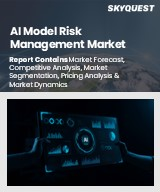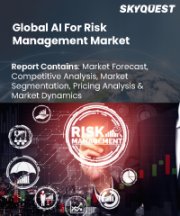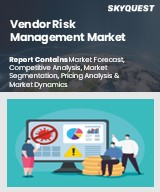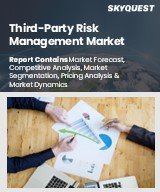
|
시장보고서
상품코드
1812587
리스크 관리 시장 : 리스크 유형별, 지역별Risk Management Market, Risk Type (Operational Risk, Financial Risk, Strategic Risk, and Hazard/Safety/Environmental), By Geography (North America, Europe, Asia Pacific, Latin America, Middle East, and Africa) |
||||||
리스크 관리 시장의 2025년 시장 규모는 149억 3,000만 달러로 추정되며, 2032년에는 402억 달러에 달할 것으로 예측되며, 2025-2032년의 CAGR은 15.2%로 추이할 것으로 예측됩니다.
| 리포트 범위 | 리포트 상세 | ||
|---|---|---|---|
| 기준연도 | 2024년 | 2025년 시장 규모 | 149억 3,000만 달러 |
| 실적 데이터 | 2020-2024년 | 예측 기간 | 2025-2032년 |
| 예측 기간 : 2025-2032년 CAGR : | 15.20% | 2032년 가치 예측 | 402억 달러 |
세계 리스크 관리 시장은 현대 비즈니스 인프라의 중요한 구성 요소이며, 다양한 조직 부문에 걸쳐 잠재적 위협을 식별, 평가 및 완화하기 위해 설계된 종합적인 솔루션을 포함하고 있습니다. 리스크 관리는 기업이 업무 효율성, 재무 안정성, 전략적 목표에 영향을 미칠 수 있는 불확실성을 예측, 평가, 대응할 수 있도록 하는 체계적인 프로세스를 포함합니다. 이 시장에는 운영 리스크, 재무 리스크, 사이버 보안 리스크, 규제 준수 리스크, 평판 리스크 등 다양한 리스크 카테고리가 포함됩니다. 세계 비즈니스 환경의 복잡성은 엄격한 규제 프레임워크와 진화하는 위협 상황과 맞물려 정교한 리스크 관리 플랫폼과 서비스를 요구하고 있습니다. 각 산업 분야의 조직들은 효과적인 리스크 관리가 단순한 컴플라이언스 요건이 아니라 지속가능한 성장과 경쟁 우위를 가져다주는 전략적 필수 요소임을 인식하고 있습니다. 시장에는 리스크 평가 소프트웨어, 거버넌스 플랫폼, 컴플라이언스 관리 시스템, 통합 리스크 관리 제품군 등 다양한 솔루션이 있습니다. 기업이 디지털 전환, 지정학적 불확실성, 기후 변화, 신기술 등 전례 없는 문제에 직면하면서 견고한 리스크 관리 솔루션에 대한 수요는 지속적으로 증가하고 있으며, 이 시장은 조직의 회복력과 장기적 성공의 기본 축으로 자리매김하고 있습니다.
시장 역학
세계 리스크 관리 시장의 성장을 주도하는 주요 요인은 각 산업 분야에서 규제 준수 요구사항이 증가하고 있으며, 기업은 막대한 벌칙과 풍문을 피하기 위해 종합적인 리스크 관리 프레임워크를 도입하고 있습니다. 디지털 전환에 대한 노력과 사이버 위협 증가로 인해 기업은 고급 위험 평가 기술과 사이버 보안 솔루션에 많은 투자를 해야 하며, 이는 시장 확대의 큰 기회를 창출하고 있습니다. 세계 공급망의 복잡성과 상호 연결된 비즈니스 운영으로 인해 첨단 리스크 모니터링 및 완화 전략이 필요하며, 이는 시장 수요를 더욱 증가시키고 있습니다. 그러나 시장은 높은 도입 비용과 기존 기업 시스템과의 통합의 복잡성 등 상당한 제약 요인에 직면해 있으며, 이는 중소기업의 종합적인 리스크 관리 솔루션 채택을 주저하게 만들고 있습니다. 또한 숙련된 리스크 관리 전문가의 부족과 조직 개혁에 대한 저항이 시장 침투의 장벽으로 작용하고 있습니다. 이러한 도전에도 불구하고 리스크 예측 및 분석에 인공지능과 머신러닝 기술이 도입되면서 보다 능동적이고 지능적인 리스크 관리 접근이 가능해졌고, 이는 큰 비즈니스 기회를 창출하고 있습니다. 환경, 사회, 지배구조(ESG) 리스크에 대한 인식이 높아짐에 따라 클라우드 기반 리스크 관리 솔루션은 모든 규모의 조직에 확장성과 비용 효율성을 갖춘 새로운 시장 부문을 제공합니다. COVID-19 팬데믹은 비즈니스 연속성 계획과 비즈니스 복원력의 중요성을 더욱 증폭시켜 급변하는 비즈니스 환경과 새로운 위협 요소에 적응할 수 있는 종합적인 리스크 관리 플랫폼에 대한 전례 없는 수요를 창출하고 있습니다.
본 조사의 주요 특징
- 세계의 리스크 관리 시장을 상세하게 분석하여 2024년을 기준 연도로 하여 예측 기간(2025-2032년) 시장 규모와 연평균 성장률(CAGR)을 조사 분석하여 전해드립니다.
- 또한 다양한 부문에 걸친 잠재적 매출 기회를 밝히고, 이 시장의 매력적인 투자 제안 매트릭스를 설명합니다.
- 또한 시장 성장 촉진요인, 억제요인, 기회, 신제품 출시 및 승인, 시장 동향, 지역별 전망, 주요 기업의 경쟁 전략 등에 대한 주요 인사이트을 제공합니다.
- 이 보고서는 기업 하이라이트, 제품 포트폴리오, 주요 하이라이트, 재무 성과, 전략 등의 매개 변수를 기반으로 세계 리스크 관리 시장의 주요 기업을 프로파일링합니다.
- 이 보고서의 인사이트를 통해 마케팅 담당자와 기업 경영진은 향후 제품 출시, 유형화, 시장 확대, 마케팅 전략에 대한 정보에 입각한 의사결정을 내릴 수 있습니다.
- 이 보고서는 투자자, 공급업체, 제품 제조업체, 유통업체, 신규 시장 진출기업, 재무 분석가 등 업계의 다양한 이해관계자를 대상으로 합니다.
- 이해관계자들은 세계 리스크 관리 시장 분석에 사용되는 다양한 전략 매트릭스를 통해 의사결정을 쉽게 내릴 수 있습니다.
목차
제1장 조사의 목적과 전제조건
- 조사 목적
- 전제조건
- 약어
제2장 시장 전망
- 리포트 설명
- 시장의 정의와 범위
- 개요
제3장 시장 역학, 규제, 동향 분석
- 시장 역학
- 영향 분석
- 주요 하이라이트
- 규제 시나리오
- 제품 발매/승인
- PEST 분석
- PORTER의 산업 분석
- 시장 기회
- 규제 시나리오
- 주요 발전
- 업계 동향
제4장 세계의 리스크 관리 시장 : 리스크 유형별, 2020-2032년
- 운영 리스크
- 재무 리스크
- 전략 리스크
- 위험/안전/환경
제5장 세계의 리스크 관리 시장 : 지역별, 2020-2032년
- 북미
- 미국
- 캐나다
- 라틴아메리카
- 브라질
- 아르헨티나
- 멕시코
- 기타 라틴아메리카
- 유럽
- 독일
- 영국
- 스페인
- 프랑스
- 이탈리아
- 러시아
- 기타 유럽
- 아시아태평양
- 중국
- 인도
- 일본
- 호주
- 한국
- ASEAN
- 기타 아시아태평양
- 중동
- GCC 국가
- 이스라엘
- 기타 중동
- 아프리카
- 남아프리카
- 북아프리카
- 중앙아프리카
제6장 경쟁 구도
- IBM
- Oracle
- SAP
- SAS Institute
- Moody's Analytics
- Wolters Kluwer
- FIS
- Fiserv
- MetricStream
- LogicManager
- Resolver
- Riskonnect
- LexisNexis Risk Solutions
- Pegasystems
- Deloitte
제7장 애널리스트의 권장사항
- 기회
- 애널리스트의 견해
- Coherent Opportunity Map
제8장 참고 문헌과 조사 방법
- 참고 문헌
- 조사 방법
- 출판사 소개
Risk Management Market is estimated to be valued at USD 14.93 Bn in 2025 and is expected to reach USD 40.20 Bn by 2032, growing at a compound annual growth rate (CAGR) of 15.2% from 2025 to 2032.
| Report Coverage | Report Details | ||
|---|---|---|---|
| Base Year: | 2024 | Market Size in 2025: | USD 14.93 Bn |
| Historical Data for: | 2020 To 2024 | Forecast Period: | 2025 To 2032 |
| Forecast Period 2025 to 2032 CAGR: | 15.20% | 2032 Value Projection: | USD 40.20 Bn |
The global risk management market represents a critical component of modern business infrastructure, encompassing comprehensive solutions designed to identify, assess, and mitigate potential threats across various organizational sectors. Risk management involves systematic processes that enable enterprises to anticipate, evaluate, and respond to uncertainties that could impact their operational efficiency, financial stability, and strategic objectives. This market encompasses diverse risk categories including operational, financial, cybersecurity, regulatory compliance, and reputational risks. The increasing complexity of global business environments, coupled with stringent regulatory frameworks and evolving threat landscapes, has necessitated sophisticated risk management platforms and services. Organizations across industries are recognizing that effective risk management is not merely a compliance requirement but a strategic imperative that drives sustainable growth and competitive advantage. The market includes various solutions such as risk assessment software, governance platforms, compliance management systems, and integrated risk management suites. As businesses face unprecedented challenges from digital transformation, geopolitical uncertainties, climate change, and emerging technologies, the demand for robust risk management solutions continues to escalate, positioning this market as a fundamental pillar of organizational resilience and long-term success.
Market Dynamics
The global risk management market growth is primarily driven by escalating regulatory compliance requirements across industries, forcing organizations to adopt comprehensive risk management frameworks to avoid substantial penalties and reputational damage. Digital transformation initiatives and increasing cyber threats are compelling businesses to invest heavily in advanced risk assessment technologies and cybersecurity solutions, creating significant market expansion opportunities. The growing complexity of global supply chains and interconnected business operations necessitates sophisticated risk monitoring and mitigation strategies, further propelling market demand. However, the market faces considerable restraints including high implementation costs and complexity of integration with existing enterprise systems, which often deter small and medium-sized enterprises from adopting comprehensive risk management solutions. Additionally, the shortage of skilled risk management professionals and resistance to organizational change create barriers to market penetration. Despite these challenges, substantial opportunities emerge from the increasing adoption of artificial intelligence and machine learning technologies in risk prediction and analysis, enabling more proactive and intelligent risk management approaches. The growing awareness of environmental, social, and governance (ESG) risks presents new market segments, while cloud-based risk management solutions offer scalable and cost-effective alternatives for organizations of all sizes. The COVID-19 pandemic has further amplified the importance of business continuity planning and operational resilience, creating unprecedented demand for comprehensive risk management platforms that can adapt to rapidly changing business environments and emerging threat vectors.
Key Features of the Study
- This report provides in-depth analysis of the global risk management market, and provides market size (USD Bn) and compound annual growth rate (CAGR%) for the forecast period (2025-2032), considering 2024 as the base year.
- It elucidates potential revenue opportunities across different segments and explains attractive investment proposition matrices for this market.
- This study also provides key insights about market drivers, restraints, opportunities, new product launches or approval, market trends, regional outlook, and competitive strategies adopted by key players.
- It profiles key players in the global risk management market based on the following parameters - company highlights, products portfolio, key highlights, financial performance, and strategies.
- Key companies covered as a part of this study include IBM, Oracle, SAP, SAS Institute, Moody's Analytics, Wolters Kluwer, FIS, Fiserv, MetricStream, LogicManager, Resolver, Riskonnect, LexisNexis Risk Solutions, Pegasystems, and Deloitte.
- Insights from this report would allow marketers and the management authorities of the companies to make informed decisions regarding their future product launches, type up-gradation, market expansion, and marketing tactics.
- The global risk management market report caters to various stakeholders in this industry including investors, suppliers, product manufacturers, distributors, new entrants, and financial analysts.
- Stakeholders would have ease in decision-making through various strategy matrices used in analyzing the global risk management market.
Market Segmentation
- Risk Type Insights (Revenue, USD Bn, 2020 - 2032)
- Operational Risk
- Financial Risk
- Strategic Risk
- Hazard/Safety/Environmental
- Regional Insights (Revenue, USD Bn, 2020 - 2032)
- North America
- U.S.
- Canada
- Latin America
- Brazil
- Argentina
- Mexico
- Rest of Latin America
- Europe
- Germany
- U.K.
- Spain
- France
- Italy
- Russia
- Rest of Europe
- Asia Pacific
- China
- India
- Japan
- Australia
- South Korea
- ASEAN
- Rest of Asia Pacific
- Middle East
- GCC Countries
- Israel
- Rest of Middle East
- Africa
- South Africa
- North Africa
- Central Africa
- Key Players Insights
- IBM
- Oracle
- SAP
- SAS Institute
- Moody's Analytics
- Wolters Kluwer
- FIS
- Fiserv
- MetricStream
- LogicManager
- Resolver
- Riskonnect
- LexisNexis Risk Solutions
- Pegasystems
- Deloitte
Table of Contents
1. Research Objectives and Assumptions
- Research Objectives
- Assumptions
- Abbreviations
2. Market Purview
- Report Description
- Market Definition and Scope
- Executive Summary
- Global Risk Management Market, By Risk Type
- Global Risk Management Market, By Region
3. Market Dynamics, Regulations, and Trends Analysis
- Market Dynamics
- Impact Analysis
- Key Highlights
- Regulatory Scenario
- Product Launches/Approvals
- PEST Analysis
- PORTER's Analysis
- Market Opportunities
- Regulatory Scenario
- Key Developments
- Industry Trends
4. Global Risk Management Market, By Risk Type, 2020-2032, (USD Bn)
- Introduction
- Market Share Analysis, 2025 and 2032 (%)
- Y-o-Y Growth Analysis, 2021 - 2032
- Segment Trends
- Operational Risk
- Introduction
- Market Size and Forecast, and Y-o-Y Growth, 2020-2032, (USD Bn)
- Financial Risk
- Introduction
- Market Size and Forecast, and Y-o-Y Growth, 2020-2032, (USD Bn)
- Strategic Risk
- Introduction
- Market Size and Forecast, and Y-o-Y Growth, 2020-2032, (USD Bn)
- Hazard/Safety/Environmental
- Introduction
- Market Size and Forecast, and Y-o-Y Growth, 2020-2032, (USD Bn)
5. Global Risk Management Market, By Region, 2020 - 2032, Value (USD Bn)
- Introduction
- Market Share (%) Analysis, 2025, 2028 & 2032, Value (USD Bn)
- Market Y-o-Y Growth Analysis (%), 2021 - 2032, Value (USD Bn)
- Regional Trends
- North America
- Introduction
- Market Size and Forecast, By Risk Type, 2020 - 2032, Value (USD Bn)
- Market Size and Forecast, By Country, 2020 - 2032, Value (USD Bn)
- U.S.
- Canada
- Latin America
- Introduction
- Market Size and Forecast, By Risk Type, 2020 - 2032, Value (USD Bn)
- Market Size and Forecast, By Country, 2020 - 2032, Value (USD Bn)
- Brazil
- Argentina
- Mexico
- Rest of Latin America
- Europe
- Introduction
- Market Size and Forecast, By Risk Type, 2020 - 2032, Value (USD Bn)
- Market Size and Forecast, By Country, 2020 - 2032, Value (USD Bn)
- Germany
- U.K.
- Spain
- France
- Italy
- Russia
- Rest of Europe
- Asia Pacific
- Introduction
- Market Size and Forecast, By Risk Type, 2020 - 2032, Value (USD Bn)
- Market Size and Forecast, By Country, 2020 - 2032, Value (USD Bn)
- China
- India
- Japan
- Australia
- South Korea
- ASEAN
- Rest of Asia Pacific
- Middle East
- Introduction
- Market Size and Forecast, By Risk Type, 2020 - 2032, Value (USD Bn)
- Market Size and Forecast, By Country, 2020 - 2032, Value (USD Bn)
- GCC Countries
- Israel
- Rest of Middle East
- Africa
- Introduction
- Market Size and Forecast, By Risk Type, 2020 - 2032, Value (USD Bn)
- Market Size and Forecast, By Country/Region, 2020 - 2032, Value (USD Bn)
- South Africa
- North Africa
- Central Africa
6. Competitive Landscape
- IBM
- Company Highlights
- Product Portfolio
- Key Developments
- Financial Performance
- Strategies
- Oracle
- Company Highlights
- Product Portfolio
- Key Developments
- Financial Performance
- Strategies
- SAP
- Company Highlights
- Product Portfolio
- Key Developments
- Financial Performance
- Strategies
- SAS Institute
- Company Highlights
- Product Portfolio
- Key Developments
- Financial Performance
- Strategies
- Moody's Analytics
- Company Highlights
- Product Portfolio
- Key Developments
- Financial Performance
- Strategies
- Wolters Kluwer
- Company Highlights
- Product Portfolio
- Key Developments
- Financial Performance
- Strategies
- FIS
- Company Highlights
- Product Portfolio
- Key Developments
- Financial Performance
- Strategies
- Fiserv
- Company Highlights
- Product Portfolio
- Key Developments
- Financial Performance
- Strategies
- MetricStream
- Company Highlights
- Product Portfolio
- Key Developments
- Financial Performance
- Strategies
- LogicManager
- Company Highlights
- Product Portfolio
- Key Developments
- Financial Performance
- Strategies
- Resolver
- Company Highlights
- Product Portfolio
- Key Developments
- Financial Performance
- Strategies
- Riskonnect
- Company Highlights
- Product Portfolio
- Key Developments
- Financial Performance
- Strategies
- LexisNexis Risk Solutions
- Company Highlights
- Product Portfolio
- Key Developments
- Financial Performance
- Strategies
- Pegasystems
- Company Highlights
- Product Portfolio
- Key Developments
- Financial Performance
- Strategies
- Deloitte
- Company Highlights
- Product Portfolio
- Key Developments
- Financial Performance
- Strategies
7. Analyst Recommendations
- Wheel of Fortune
- Analyst View
- Coherent Opportunity Map
8. References and Research Methodology
- References
- Research Methodology
- About us



















